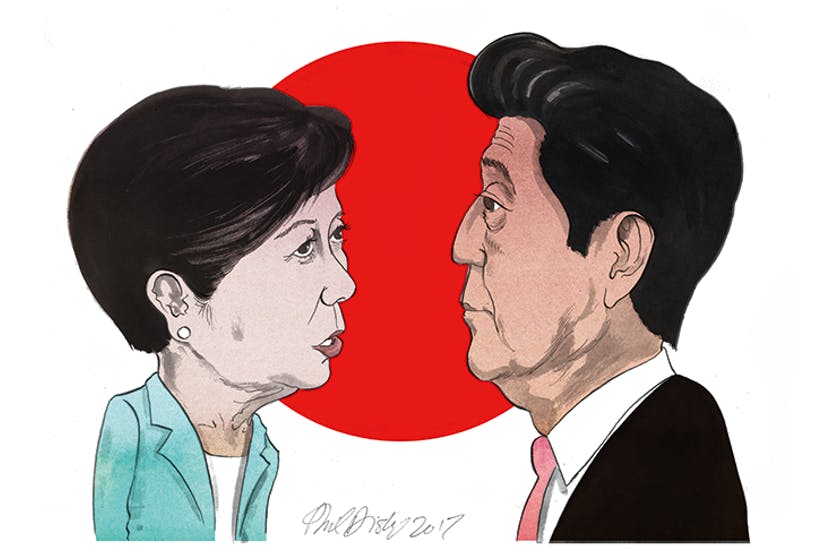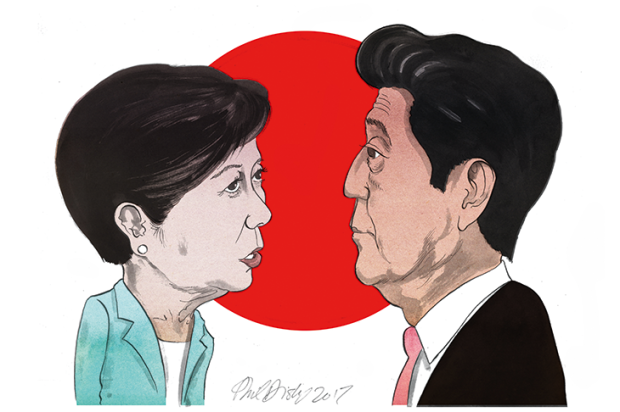As the only nation to have suffered mass casualties from a nuclear bomb, Japan has been understandably nervous about Kim Jong-un’s missile tests. Sales of domestic nuclear bunkers and gas masks have soared and nationally aired TV ads with a chilling ‘Protect and Survive’ flavour urge residents to hunker behind washing machines in basements and stay away from windows. This is one reason why Shinzo Abe, Japan’s long-standing Prime Minister, felt confident enough to surprise the world this week and call a snap election.
In the light of Theresa May’s recent disaster, it seemed to many like a rash move. Here, on the face of it, is a Prime Minister in a very similar position to the one May held in June: seeking to consolidate support at a moment when the opposition is in disarray, predictions of a landslide… But Abe is bullish. If he doesn’t win an outright majority, he says, he will resign. And there are reasons to think he is a far safer bet than May ever was.
There’s the fact that he’s about as seasoned a politician as it is possible to imagine. He has already had three terms as the Liberal Democratic Party (LDP) prime minister (there is no limit on the number of terms a Japanese prime minister may hold), and as his people know, he really is the man to face down any threat from crazy Kim Jong-un.
Abe is known as a tough operator over North Korea. He is admired in Japan for getting one over on Kim Jong-il in 2002, when he helped negotiate a deal for Japanese abductees in North Korea to visit Japan — though once in Japan the abductees refused to go back. Abe says that ‘talk for talk’s sake’ between Japan, the US and North Korea has achieved nothing. He now wants to take a different tack and bolster Japan’s ability to take a more active war-fighting stance, currently restricted under the post-war pacifist constitution. In April this year he even raised the spectre of sarin-tipped North Korean missiles, evoking one of Japan’s most painful memories, the Tokyo sarin gas attacks of 1995.
All this tough talk has led critics to claim that he is exploiting public fears for political gain — and they have a point. But those fears could be well-founded.
The same is true in the economic sphere. Abe promises a turbocharging of so-called ‘Abenomics’. Tax increases are planned for 2019 to pay off the national debt, but in a new twist Abe has promised that around 40 per cent of the amount raised (¥2 trillion out of a total of ¥5 trillion) will be ring-fenced to pay for ‘the challenge of breaking the greatest wall — a declining birthrate and an ageing population’.
If this sounds pedestrian, it isn’t. Again, it taps into Japanese fears that the nation’s demography is out of control, that women are not having enough children and soon there will be no one to push everyone else’s wheelchairs. Again, the people have a point.
But there’s another reason that Abe might think it important to press home his advantage, and that reason is Abe’s Jeremy Corbyn, Yuriko Koike, the first-ever female governor of Tokyo. Koike is an almost equally seasoned politician. She’s been environment minister and Japan’s first female minister of defence under Abe, but left the LDP in May this year. Last week she founded the ‘Hope Party’ (Kibou no Tou), an attempt to appeal to Japanese voters who are tired of politics-as-usual and Japan’s old male-dominated society and want something unconventional.
Koike is almost professionally unconventional. When she was a young girl, so her story goes, her father told her: ‘It’s shameful to do what everybody does.’ So she studied at the American University in Cairo, then used her Arabic to get into TV, where she made her mark as a news commentator taking on the male host. Because she takes on the old guard, Koike has a great following of young Japanese who attend her rallies waving broccoli in honour of her green credentials. One of her stranger pitches to the young when running for governor was to promise that the whole of Tokyo would be turned into an ‘anime-land’.
‘I am raising my flag for real,’ Ms Koike said at a press conference this week. ‘Japan is facing a difficult time considering the situation in North Korea. Economically, the world is making a big move while Japan’s presence is gradually declining. Can we continue letting the establishment handle politics?’
There’s no doubt that Koike’s appeal played a part in Abe’s decision. Even she might find it hard to work up enough anti-establishment feeling to snatch victory from Abe in just three weeks, though stranger things have happened.
The election is perhaps also timed to allow Abe to ride out his own version of the Whitewater scandal, involving the allegedly corrupt sale of building land. Calling the election now will necessitate the immediate dissolution of the lower house in preparation for elections on 22 October, which in turn means that his opponents will be unable to ask any more inconvenient questions in the Diet.
Abe may feel that he will never be more popular than he is now. But the danger in his situation is pointed out by Aiji Tanaka, Professor of Political Science at Waseda University: ‘The situation looks so in favour of the LDP that some of its casual supporters may skip the voting because they think the LDP will win anyway, regardless of whether they go to vote,’ he says. If Abe then does badly, ‘this could fuel calls within the party for his replacement’.
To the British voter, this might sound spookily familiar.
Got something to add? Join the discussion and comment below.
Get 10 issues for just $10
Subscribe to The Spectator Australia today for the next 10 magazine issues, plus full online access, for just $10.
You might disagree with half of it, but you’ll enjoy reading all of it. Try your first month for free, then just $2 a week for the remainder of your first year.














Comments
Don't miss out
Join the conversation with other Spectator Australia readers. Subscribe to leave a comment.
SUBSCRIBEAlready a subscriber? Log in